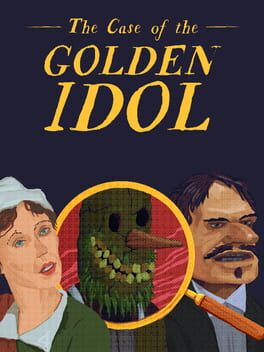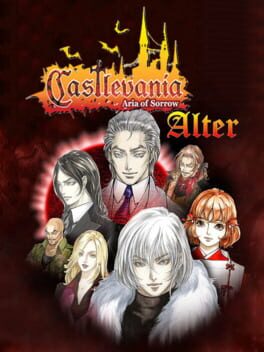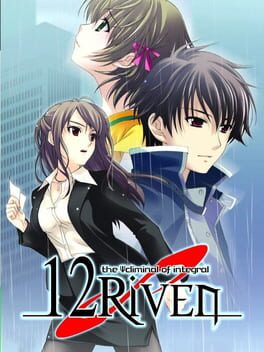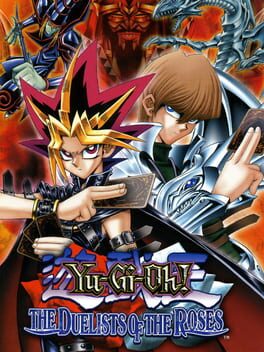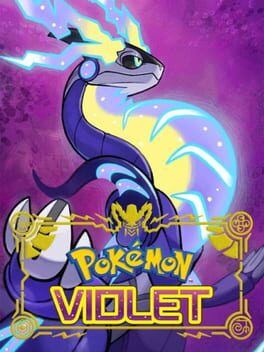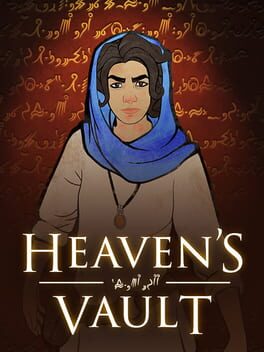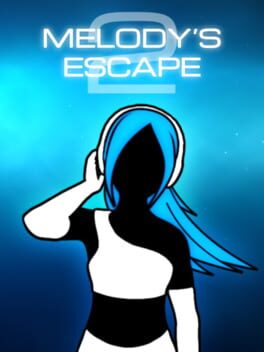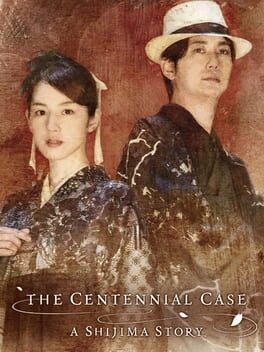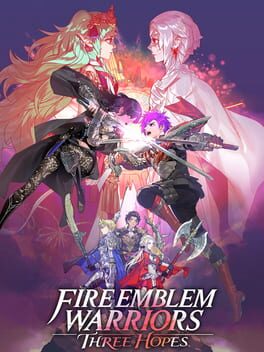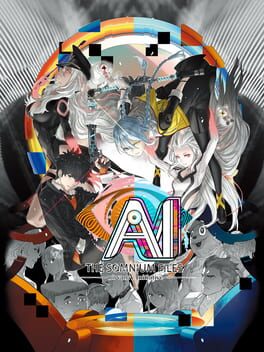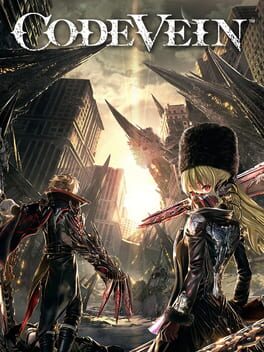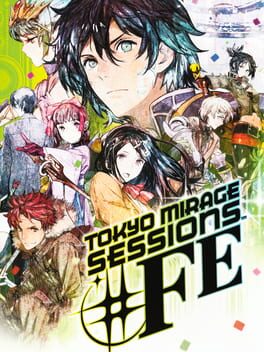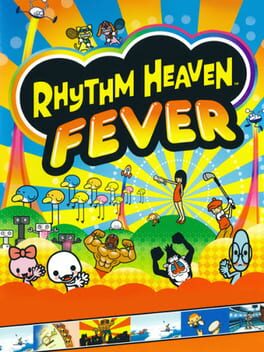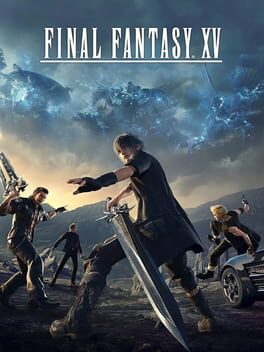LunaFlare
This was pretty good! The deduction mechanics feel quite like Return of the Obra Dinn, but it's also very much its own thing, which is great, even if its narrative structure feels a bit less compelling. It felt a bit short, but that's understandable given its indie status, and the general difficulty of crafting tight mysteries. I particularly appreciated how looking closely at details to solve individual mysteries incidentally exposes you to the overarching plot, which you eventually need to get your head around to clutch things out. A very satisfying and cerebral experience.
Yeah, this does exactly what it sets out to pretty well. A new exploration experience with the same great Aria mechanics. I appreciate that it doesn't go out of its way to be a "difficulty hack", a genre I often consider tedious and overtuned.
To be clear, I don't necessarily think Aria is a 5 star game or that this is a huge improvement, but given that this game as an Aria hack, I think it does about as good a job of that as can be expected - which is to say, I do like it a lot!
To be clear, I don't necessarily think Aria is a 5 star game or that this is a huge improvement, but given that this game as an Aria hack, I think it does about as good a job of that as can be expected - which is to say, I do like it a lot!
There was a point in this game where I thought I was actually going to like it a fair bit. But the game increasingly sort of fumbled the bag as it continued past that point.
The pacing is atrocious at times. At its best, the cutting between perspectives increases tension, but quite often it just draws out already lengthy conversations, with the individual scenes feeling like you got nothing out of them. This is especially egregious when it's the third or tenth time Maina's lecture is covering the same thematic ground.
The general structure of the game is a bit boring compared to its cousins. You only have three routes - besides the true route, the other two routes cover completely separate perspectives. And for all three routes, they feature no branching besides a handful of bad ends, and it's very unclear how your choices influence which route you're on. It feels less like you're gathering knowledge to work towards the best timeline, and more just that you're watching a mostly-linear novel play out. That's not an inherently invalid structure - kinetic novels are a thing - but it's not really what I'm coming to Uchi for.
There was one character I really liked, and that was carrying my opinion of the game on its back for a while, but the plot ignored her for a long time and eventually gave her an absolutely appalling resolution. Most of the other characters are... eh. Not terribly compelling.
When the game is at its best, there's a lot of enjoyment to be gotten out of pondering the mysteries and putting clues together, but that's also true of numerous better games, that don't fall apart into a confusing mess as they progress.
Still, I find the game at least interesting. It feels quite distinct from Uchikoshi's other works on either side of it, most similar to the brand new stuff. I do find it a shame that there's no means for English speakers to play it for themselves.
The pacing is atrocious at times. At its best, the cutting between perspectives increases tension, but quite often it just draws out already lengthy conversations, with the individual scenes feeling like you got nothing out of them. This is especially egregious when it's the third or tenth time Maina's lecture is covering the same thematic ground.
The general structure of the game is a bit boring compared to its cousins. You only have three routes - besides the true route, the other two routes cover completely separate perspectives. And for all three routes, they feature no branching besides a handful of bad ends, and it's very unclear how your choices influence which route you're on. It feels less like you're gathering knowledge to work towards the best timeline, and more just that you're watching a mostly-linear novel play out. That's not an inherently invalid structure - kinetic novels are a thing - but it's not really what I'm coming to Uchi for.
There was one character I really liked, and that was carrying my opinion of the game on its back for a while, but the plot ignored her for a long time and eventually gave her an absolutely appalling resolution. Most of the other characters are... eh. Not terribly compelling.
When the game is at its best, there's a lot of enjoyment to be gotten out of pondering the mysteries and putting clues together, but that's also true of numerous better games, that don't fall apart into a confusing mess as they progress.
Still, I find the game at least interesting. It feels quite distinct from Uchikoshi's other works on either side of it, most similar to the brand new stuff. I do find it a shame that there's no means for English speakers to play it for themselves.
I love how silly this game is and legitimately enjoy its SRPG/card-game hybrid mechanics, but it's kind of a mess. Getting a functional deck outside of your starter is an absurd grind, the AI kind of crumbles against an aggressive playstyle, half of the game's mechanics are so grindy and obscure that they can't possibly come up in the short length of a playthrough - it's hard to imagine what the developers were actually envisioning for the player's experience.
2022
OK, so, Donphan in the room, the technical issues. They're definitely present and noticable. For me personally, as a connoisseur of janky-ass games like Zero Escape, I'm not the kind of person to have my enjoyment affected by them, even if "the most profitable franchise in the world" should give its developers time to do actual QA. That said, I honestly don't think other aspects of the game feel that rushed at all.
First of all, as a baseline, it's Pokemon. This might be a hot take these days, but that's a pretty good thing to be! Palling around with these cute creatures and building your team in this accessible but relatively-deep JRPG framework is fun and satisfying.
The new facets of gameplay are great. A good open world is, IMO, characterised by being able to fuck around somewhere you have no right to be, and taking a risk to cheese a later-game event for an early reward. I was able to do both of those in this game, so it gets a thumbs up from me. I cannot comprehend the people who wanted this game to scale its levels to you. Have you ever heard of FF8? Oblivion? It would have been a disaster!
The multiple progression tracks, instead of having them arbitrarily and linearly interwoven, is a big winner for me too. It was great to be able to choose at my own pace when I'm sick of zipping between gyms, and go off to try another kind of challenge - with their own unique rewards. I actually found the gyms the least interesting part, because, get this - they had the least story attached.
Crazy, I know! I actually really like the writing in this game. It's no thematically deep narrative, but there's just enough going on to be interesting, and the character interactions - along with facial expressiveness - is honestly, actually, no-qualifiers good. Arven's desperate hope - almost in denial - that his injured companion can recover, Penny's blatant trans-coding, Team Star's unity in the face of being outcast, and the whole party dynamics when they come together at the end of the game - I love these idiots! There was a lot of love poured into the flavour for the school part of the game as well. And then the finale was actually a somewhat tense climax instead of a rote champion battle, complete with good old convoluted JRPG melodrama.
The multiplayer was a little disappointing - I get the impression that they couldn't do everything they wanted, because systems like the real-time, in-world battles feel made for multiplayer spectating but apparently it doesn't actually work that way. Still, just being able to hang out with friends in the same space while you do your own thing is a good time, and it does work very well with wild Pokemon, seeing each other battle and being able to share exclusives.
I dunno man! The game's good! Probably my favourite Pokemon game! I get that hating on Pokemon is the cool thing to do now because you couldn't import Scrimblo Bungus from Generation 2 into the last game but stop missing the forest for the poorly-rendered trees for just one second and actually evaluate the game on its own merits.
First of all, as a baseline, it's Pokemon. This might be a hot take these days, but that's a pretty good thing to be! Palling around with these cute creatures and building your team in this accessible but relatively-deep JRPG framework is fun and satisfying.
The new facets of gameplay are great. A good open world is, IMO, characterised by being able to fuck around somewhere you have no right to be, and taking a risk to cheese a later-game event for an early reward. I was able to do both of those in this game, so it gets a thumbs up from me. I cannot comprehend the people who wanted this game to scale its levels to you. Have you ever heard of FF8? Oblivion? It would have been a disaster!
The multiple progression tracks, instead of having them arbitrarily and linearly interwoven, is a big winner for me too. It was great to be able to choose at my own pace when I'm sick of zipping between gyms, and go off to try another kind of challenge - with their own unique rewards. I actually found the gyms the least interesting part, because, get this - they had the least story attached.
Crazy, I know! I actually really like the writing in this game. It's no thematically deep narrative, but there's just enough going on to be interesting, and the character interactions - along with facial expressiveness - is honestly, actually, no-qualifiers good. Arven's desperate hope - almost in denial - that his injured companion can recover, Penny's blatant trans-coding, Team Star's unity in the face of being outcast, and the whole party dynamics when they come together at the end of the game - I love these idiots! There was a lot of love poured into the flavour for the school part of the game as well. And then the finale was actually a somewhat tense climax instead of a rote champion battle, complete with good old convoluted JRPG melodrama.
The multiplayer was a little disappointing - I get the impression that they couldn't do everything they wanted, because systems like the real-time, in-world battles feel made for multiplayer spectating but apparently it doesn't actually work that way. Still, just being able to hang out with friends in the same space while you do your own thing is a good time, and it does work very well with wild Pokemon, seeing each other battle and being able to share exclusives.
I dunno man! The game's good! Probably my favourite Pokemon game! I get that hating on Pokemon is the cool thing to do now because you couldn't import Scrimblo Bungus from Generation 2 into the last game but stop missing the forest for the poorly-rendered trees for just one second and actually evaluate the game on its own merits.
2019
This review contains spoilers
This is an immensely cool concept that only barely manages to rise above the janky and frustrating gameplay it's behind. I'll save actually listing all of my complains for the end of the review so that you don't have to scroll past it, but for now suffice to say that the game is extremely slow and tedious, you're constantly being interrupted and having to wait. It was bad enough that I couldn't bear repeating it for a second playthrough, even though I was excited by the prospect of a New Game+ with deeper puzzles.
Visually, the game's artstyle looks unique and great in stills, but in motion, in gameplay, I found it very jarring, with the minimal animations, leaving behind inexplicable specters as you walk, and awkward camera issues as the game tries to dynamically make a cutscene out of wherever you're standing.
So then, the concept that redeems all this. Even with the shallow nature of the conlang, and the puzzles often being more about guessing what words make sense rather than interpreting the glyphs, it was still a fun, satisfying mechanic, and I was always motivated to push through the tedium of the rest of the game in the hopes of getting to more inscriptions. The setting and history are really engaging too, especially with the way you uncover it being a fundamental part of the game's flow.
I was also impressed with how dynamic and open the game seemed, with you able to learn new information in radically different orders, and in conversation Aliya's dialogue will reflect that.
As far as the actual plot goes though - Iiiii dunno. The secret hyperadvanced precursor society - if you can call it a society - is a pretty played-out trope, and the focus on the entropy of the universe kind of undermines the importance of looking at history and learning the language. Unless I missed it, you don't even get offered the chance to translate the huge amounts of ancient script in the Vault. Nothing you learned matters, because everything is doomed and you need to either leave it all behind or (I assume) die for your principles if you refuse to. In general, the last minute ending split tends to be a red flag.
I do love the "Vault" wordplay - secrets hiding in plain sight on the cover and all that - but the very fact it's wordplay relies on the shallowness of the conlang. Why would "safe-underground-place" and "travel-high-far-fast" be the same word in such an ideographic language?
Right: Time to whine. Each of these complaints is individually minor, but they add up to a tedious, frustrating experience. It's a mix of small one-time things and game-spanning quibbles that never go away.
As already mentioned, the game's visual style is pretty strange in motion.
The dialogue system is really slowly paced, unvoiced, and doesn't have the best contrast against the background. Lines appear one-by-one far slower than I'd like, with no option I could find to bring up the next line early. Voiced lines are extremely rare, and don't always seem important enough to get that distinction, compared to the conversations that go unvoiced.
Aliya is... kind of a dick, sometimes to an unwarranted degree, and sometimes you don't really have any good choices, or you don't realise a choice will go where it does. I like to try to be nice! This does have the upside of making Aliya a distinct character, but the amount of game you spend choosing responses feels at odds.
The game doesn't seem to like alt-tabbing very much.
I'm not sure if it was a related issue or just intentional design, but when I played the game, a lot of it was almost silent. Not just the lack of dialogue, but few-to-no music or sound effects. It was eerie, and not in situations where it would be intentionally so.
The game likes to take control away from you to walk down stairs or through doorways and such. This increases the feeling that you spend a lot of time waiting, without player agency. Additionally, if you're in the middle of a conversation, which can usually play out while you walk, you'll stop dead in your tracks until it plays out in full, including any responses.
Six bugs you to return to the ship almost every time you cross a threshold once you've cleared one plot flag on a moon, even if you're trying to walk directly another one.
I don't know that there's much benefit to doing so anyway, but does Huang have to walk away slowly with each individual artefact I give him when he knows I have five more?
Like I said, I have some mechanical gripes with the translation mechanic. When you're trying to define word boundaries, I couldn't figure out a way to make the game try it even if I knew everything left I could add was wrong. And every time you do get it wrong, often being just forced to, you have to sit through Aliya or Six chiming in with the slow dialogue system, then all of your progress is discarded and you have to place it all back again.
Also, I wanted to be able to search inscriptions by words. If a definition is rejected and I need to choose a new one, I want to be able to see the context I previously defined it in, and if the definition of a word updates, I want to review other inscriptions it was in, even if it's not all locked in yet.
When sailing, the slow dialogue system will sometimes make you miss turns. They could have taken more care to keep those lines shorter so that the important thing is always in the first message.
Visually, the game's artstyle looks unique and great in stills, but in motion, in gameplay, I found it very jarring, with the minimal animations, leaving behind inexplicable specters as you walk, and awkward camera issues as the game tries to dynamically make a cutscene out of wherever you're standing.
So then, the concept that redeems all this. Even with the shallow nature of the conlang, and the puzzles often being more about guessing what words make sense rather than interpreting the glyphs, it was still a fun, satisfying mechanic, and I was always motivated to push through the tedium of the rest of the game in the hopes of getting to more inscriptions. The setting and history are really engaging too, especially with the way you uncover it being a fundamental part of the game's flow.
I was also impressed with how dynamic and open the game seemed, with you able to learn new information in radically different orders, and in conversation Aliya's dialogue will reflect that.
As far as the actual plot goes though - Iiiii dunno. The secret hyperadvanced precursor society - if you can call it a society - is a pretty played-out trope, and the focus on the entropy of the universe kind of undermines the importance of looking at history and learning the language. Unless I missed it, you don't even get offered the chance to translate the huge amounts of ancient script in the Vault. Nothing you learned matters, because everything is doomed and you need to either leave it all behind or (I assume) die for your principles if you refuse to. In general, the last minute ending split tends to be a red flag.
I do love the "Vault" wordplay - secrets hiding in plain sight on the cover and all that - but the very fact it's wordplay relies on the shallowness of the conlang. Why would "safe-underground-place" and "travel-high-far-fast" be the same word in such an ideographic language?
Right: Time to whine. Each of these complaints is individually minor, but they add up to a tedious, frustrating experience. It's a mix of small one-time things and game-spanning quibbles that never go away.
As already mentioned, the game's visual style is pretty strange in motion.
The dialogue system is really slowly paced, unvoiced, and doesn't have the best contrast against the background. Lines appear one-by-one far slower than I'd like, with no option I could find to bring up the next line early. Voiced lines are extremely rare, and don't always seem important enough to get that distinction, compared to the conversations that go unvoiced.
Aliya is... kind of a dick, sometimes to an unwarranted degree, and sometimes you don't really have any good choices, or you don't realise a choice will go where it does. I like to try to be nice! This does have the upside of making Aliya a distinct character, but the amount of game you spend choosing responses feels at odds.
The game doesn't seem to like alt-tabbing very much.
I'm not sure if it was a related issue or just intentional design, but when I played the game, a lot of it was almost silent. Not just the lack of dialogue, but few-to-no music or sound effects. It was eerie, and not in situations where it would be intentionally so.
The game likes to take control away from you to walk down stairs or through doorways and such. This increases the feeling that you spend a lot of time waiting, without player agency. Additionally, if you're in the middle of a conversation, which can usually play out while you walk, you'll stop dead in your tracks until it plays out in full, including any responses.
Six bugs you to return to the ship almost every time you cross a threshold once you've cleared one plot flag on a moon, even if you're trying to walk directly another one.
I don't know that there's much benefit to doing so anyway, but does Huang have to walk away slowly with each individual artefact I give him when he knows I have five more?
Like I said, I have some mechanical gripes with the translation mechanic. When you're trying to define word boundaries, I couldn't figure out a way to make the game try it even if I knew everything left I could add was wrong. And every time you do get it wrong, often being just forced to, you have to sit through Aliya or Six chiming in with the slow dialogue system, then all of your progress is discarded and you have to place it all back again.
Also, I wanted to be able to search inscriptions by words. If a definition is rejected and I need to choose a new one, I want to be able to see the context I previously defined it in, and if the definition of a word updates, I want to review other inscriptions it was in, even if it's not all locked in yet.
When sailing, the slow dialogue system will sometimes make you miss turns. They could have taken more care to keep those lines shorter so that the important thing is always in the first message.
2022
I've got to say, a sequel to Melody's Escape was one of the last things I expected to see announced. The first one, like Audiosurf, was a decent way to listen to music while engaging with it more actively (ADHD brain woohoo). However, it had some issues - the relationship between the generated chart and the music was... tenuous, at best, and there was some seriously bad potential for eyestrain. After trying out the sequel now that it's come out in early access, here are some of my first impressions.
The new over-the-shoulder perspective is a lot better for the eyestrain issue, though it's still not perfect. Especially when the track is moving particularly fast, the sides can blur and pulse unpleasantly.
The new chart generation definitely has some wins, with sequences which are on-beat and match up in a fun way. However, this does make the misses stand out more. It doesn't feel like many of my mistakes are my fault, or at the very least it's hard to tell.
The lowest-intensity gameplay style, where Melody walks slowly and notes descend into her hand, is a jarring disconnect from the auto-runner nature of the rest of the game. It's terribly unclear where the target for the falling notes is.
All-in-all, no procedural rhythm game is ever going to rock the world, but as an interactive visualiser for your own music collection, I think this is one of my favourite in the genre so far. The gameplay is simple enough that it's much easier to land on a well-fitting chart, compared to something like Audiosurf.
The new over-the-shoulder perspective is a lot better for the eyestrain issue, though it's still not perfect. Especially when the track is moving particularly fast, the sides can blur and pulse unpleasantly.
The new chart generation definitely has some wins, with sequences which are on-beat and match up in a fun way. However, this does make the misses stand out more. It doesn't feel like many of my mistakes are my fault, or at the very least it's hard to tell.
The lowest-intensity gameplay style, where Melody walks slowly and notes descend into her hand, is a jarring disconnect from the auto-runner nature of the rest of the game. It's terribly unclear where the target for the falling notes is.
All-in-all, no procedural rhythm game is ever going to rock the world, but as an interactive visualiser for your own music collection, I think this is one of my favourite in the genre so far. The gameplay is simple enough that it's much easier to land on a well-fitting chart, compared to something like Audiosurf.
It's a shame, if somewhat unsurprising, that Square Enix completely failed to promote this game, especially in the west, as well as quashing videos of it by would-be fans.
"Narrative mystery game" is a genre with a lot of competition in my recent memory, but it distinguishes itself with its comparatively down-to-earth tone, which is reinforced by its use of live action performances. I was quite impressed by the story.
The actual interactive mystery solving bits were hit or miss. There were a lot of points - possibly translation issues - where it wasn't clear what an option meant, which made it hard to follow the logic of the case the way the game expected.
The mechanics were a bit simplistic too. It mostly consisted of throwing stuff at the wall and having the game generate ideas for you to accept or reject - and as said, that was sometimes tricky for seemingly unintentional reasons. There were a lot of blatantly pointless dialogue choices too.
Still, I can enjoy a good marginally-interactive narrative, and the presentation of it all - including both performances and UI - was very nice. The music was quite memorable as well. The game certainly deserves a better chance than its publisher gave it.
Oh, I should also point out that I turned off the dub after five seconds. It sounded like a bored dub of a foreign movie on a cheap TV channel. So I don't think that was very good, but I played without it and enjoyed the Japanese performances with subs.
"Narrative mystery game" is a genre with a lot of competition in my recent memory, but it distinguishes itself with its comparatively down-to-earth tone, which is reinforced by its use of live action performances. I was quite impressed by the story.
The actual interactive mystery solving bits were hit or miss. There were a lot of points - possibly translation issues - where it wasn't clear what an option meant, which made it hard to follow the logic of the case the way the game expected.
The mechanics were a bit simplistic too. It mostly consisted of throwing stuff at the wall and having the game generate ideas for you to accept or reject - and as said, that was sometimes tricky for seemingly unintentional reasons. There were a lot of blatantly pointless dialogue choices too.
Still, I can enjoy a good marginally-interactive narrative, and the presentation of it all - including both performances and UI - was very nice. The music was quite memorable as well. The game certainly deserves a better chance than its publisher gave it.
Oh, I should also point out that I turned off the dub after five seconds. It sounded like a bored dub of a foreign movie on a cheap TV channel. So I don't think that was very good, but I played without it and enjoyed the Japanese performances with subs.
This review contains spoilers
Whoo boy. This is gonna be a rough one.
The game makes a very promising start, with an interesting butterfly-effect premise and some welcome expansion on the world of Three Houses. However, I find that by the end of the game it squanders a lot of that potential. In Crimson Blaze and Golden Wildfire, the events of the plot feel largely like filler, with progress in the war being prevented or undone at every turn. Agartha still isn't very well explored despite the protagonist coming directly from it. Despite the extremely promising move of Edelgard expelling the Agarthans from the Empire immediately, she fails to meaningfully deal with them later, despite regular teases like the Edelgard/Lysithea/Hapi paralogue - Cornelia doesn't even show up outside of Azure Gleam. From my perspective on the Church of Seiros, Claude turning on the church is nice... but now his route is basically just a carbon copy of Edelgard's instead of Rhea's.
As for Azure Gleam - defending Rhea after the last two routes is distinctly uncomfortable, Edelgard being hollowed out into an empty shell by Agartha removes any potential nuance from the notion of a war against her, which is an absolutely cowardly way to make the player not feel bad about their choices, and the fact this is the route where we deal with Agartha the most, when Edelgard is no longer a character, is just unbelievably frustrating.
I've heard that in interviews, the writers talked about not wanting to make the plot of this game "obsolete" Three
Houses in the sense that the outcomes are entirely better for the world. I understand what they're going for, but it's extremely awkward in practice. From a "state of the world" perspective, every ending is just "wow they sure did keep warring forever, life sucks huh", and this is "not better" than Three Houses but it's just empty nihilism in the form of a text crawl, robbing the endings of being at all interesting. To complicate matters, the timeline does come off as better from a character-driven player's perspective unless you kill Byleth, because many characters like Monica, Rodrigue and Jeralt no longer die as they unavoidably do in Three Houses - some enemy combatants die, but a surprising amount survive and then disappear forever anyway because the game's almost over.
As far as the gameplay goes - Musou is Musou, mashing buttons and mowing down hordes remains fun, but man there were too many damn battles in this game, and only the end-of-chapter ones had anything going on. In an average late game chapter you have 8ish map squares, 1-3 bonus battles, and 0-2 paralogues, with only the paralogues being remotely interesting. The time on my first playthrough was over 40 hours, and halfway through my second I got sick of it and started spamming Vanguard Whistles to skip any battles I could. Musou doesn't hold up for 120 hours.
The class system is... bleeeegh. I want to like it, but the fact classes can't wield multiple weapons really ruins it. There's only one magic capstone class, stuck on foot, and the theoretically-hybrid cavalry classes are physical-based and down an entirely different class tree. Every axe user has to pick up a mount, because War Master is only for brawlers. Trickster, a class visually designed to be an extravagant, showy magic hybrid, is now the capstone to the stealthy, dexterity-based Thief line. It's all really incohesive. This class tree system is potentially really good, but it needed to have classes designed from the ground up to work with it, and character archetypes who fit with those classes, instead of trying to retrofit it to Three Houses' class selection, which was designed for a completely different class system.
Even the music was kind of disappointing. The soundtrack tries to distinguish its arrangements from the Three Houses originals by, in many cases, adding electric guitar, in a way that makes it all blend together into an indistinct attempt to be "cool".
All-in-all I'm glad I played it - Musou is still very fun in moderation, and the opening hours were extremely interesting, but man. I don't know if I'd have enjoyed buying this day 1 even if it didn't snipe AINI's release date, so I'm glad that circumstance ensured I didn't.
The game makes a very promising start, with an interesting butterfly-effect premise and some welcome expansion on the world of Three Houses. However, I find that by the end of the game it squanders a lot of that potential. In Crimson Blaze and Golden Wildfire, the events of the plot feel largely like filler, with progress in the war being prevented or undone at every turn. Agartha still isn't very well explored despite the protagonist coming directly from it. Despite the extremely promising move of Edelgard expelling the Agarthans from the Empire immediately, she fails to meaningfully deal with them later, despite regular teases like the Edelgard/Lysithea/Hapi paralogue - Cornelia doesn't even show up outside of Azure Gleam. From my perspective on the Church of Seiros, Claude turning on the church is nice... but now his route is basically just a carbon copy of Edelgard's instead of Rhea's.
As for Azure Gleam - defending Rhea after the last two routes is distinctly uncomfortable, Edelgard being hollowed out into an empty shell by Agartha removes any potential nuance from the notion of a war against her, which is an absolutely cowardly way to make the player not feel bad about their choices, and the fact this is the route where we deal with Agartha the most, when Edelgard is no longer a character, is just unbelievably frustrating.
I've heard that in interviews, the writers talked about not wanting to make the plot of this game "obsolete" Three
Houses in the sense that the outcomes are entirely better for the world. I understand what they're going for, but it's extremely awkward in practice. From a "state of the world" perspective, every ending is just "wow they sure did keep warring forever, life sucks huh", and this is "not better" than Three Houses but it's just empty nihilism in the form of a text crawl, robbing the endings of being at all interesting. To complicate matters, the timeline does come off as better from a character-driven player's perspective unless you kill Byleth, because many characters like Monica, Rodrigue and Jeralt no longer die as they unavoidably do in Three Houses - some enemy combatants die, but a surprising amount survive and then disappear forever anyway because the game's almost over.
As far as the gameplay goes - Musou is Musou, mashing buttons and mowing down hordes remains fun, but man there were too many damn battles in this game, and only the end-of-chapter ones had anything going on. In an average late game chapter you have 8ish map squares, 1-3 bonus battles, and 0-2 paralogues, with only the paralogues being remotely interesting. The time on my first playthrough was over 40 hours, and halfway through my second I got sick of it and started spamming Vanguard Whistles to skip any battles I could. Musou doesn't hold up for 120 hours.
The class system is... bleeeegh. I want to like it, but the fact classes can't wield multiple weapons really ruins it. There's only one magic capstone class, stuck on foot, and the theoretically-hybrid cavalry classes are physical-based and down an entirely different class tree. Every axe user has to pick up a mount, because War Master is only for brawlers. Trickster, a class visually designed to be an extravagant, showy magic hybrid, is now the capstone to the stealthy, dexterity-based Thief line. It's all really incohesive. This class tree system is potentially really good, but it needed to have classes designed from the ground up to work with it, and character archetypes who fit with those classes, instead of trying to retrofit it to Three Houses' class selection, which was designed for a completely different class system.
Even the music was kind of disappointing. The soundtrack tries to distinguish its arrangements from the Three Houses originals by, in many cases, adding electric guitar, in a way that makes it all blend together into an indistinct attempt to be "cool".
All-in-all I'm glad I played it - Musou is still very fun in moderation, and the opening hours were extremely interesting, but man. I don't know if I'd have enjoyed buying this day 1 even if it didn't snipe AINI's release date, so I'm glad that circumstance ensured I didn't.
2022
It's hard to know what to say about this. I'd already fallen in love with the SNES original, so from my own perspective, crediting the remake with what a good game LIVE A LIVE is feels redundant. But it's also good to know for the vast majority of people coming to it as their first experience with the game. I'll focus on the details of the remake here, since that's the perspective I'm bringing to the game. For reference I'd probably rate the original 4.5 stars, which in my journal tends to mean "beloved game with noticeable flaws".
The remake deals with most of those flaws handily. There are two overarching issues I'd ascribe to the SNES original. The first is opacity in the combat system - the effect of your moves is described in a single line of text, which is even more compressed in the fan translation due to the efficiency of Japanese. Each character has a whole host of moves to try and figure out what they do, and you don't stay with them long enough to really learn it. It was overwhelming. The remake updates the battle screen to have all the information you need in the UI - a much longer description, elements and status effects summarised by icons, and a tracker for enemy health and weaknesses. The combat feels so much better now that you can easily tell your moves apart and see when to apply them to weaknesses.
The other big issue was the old school JRPG event flag jank. Several chapters involve wandering from point to point trying to figure out what progresses the plot, with navigation sometimes being difficult and objectives unclear. The remake adds an objective radar to the screen. Much has been said of how objective markers are the scourge of modern game design etc etc but I think it works really well here. It only ever points to the main objective to progress the plot of the chapter, players are still expected to find things on their own where that was originally true, such as exploration in the Western and Ninja chapters. Otherwise, chapters are short and linear enough as a result of their bite-sized nature that it's not like there's some grand adventure they're spoiling.
With those issues solved, what about other improvements? Well, the new translation (and of course remember the fan translation was never official) is largely fantastic, though some the punch isn't quite there for some one-liners the Japanese community seems to love. This is presumably a result of SE's localisation policy being holistic rather than line-by-line, and overall I think that's a good thing, so this is just a natural trade-off with that approach.
It barely bears saying that the HD-2D style looks fantastic. What stands out here is how the enemy designs are fundamentally the same, compare and contrast any sprite with the SNES original, and it transfers so well to the style here. It's a perfect fit for the Octopath style of "tiny protag, giant boss", 24 years earlier.
To be completely honest, I was kind of unsure how I felt about the arranged OST from some of the trailers - but seeing it in practice, no, it's great. Shimomura's original compositions still stand up, and the new arrangements breathe them some fresh air for the modern era.
I don't want to get too into the weeds here but there were a host of small mechanical changes to individual things that I found were all improvements.
All in all, this is exactly the remake the game has always needed. It's the same fantastic core game, with a beautiful new presentation, and fixing the janky accessibility issues with the original. I couldn't be happier.
The remake deals with most of those flaws handily. There are two overarching issues I'd ascribe to the SNES original. The first is opacity in the combat system - the effect of your moves is described in a single line of text, which is even more compressed in the fan translation due to the efficiency of Japanese. Each character has a whole host of moves to try and figure out what they do, and you don't stay with them long enough to really learn it. It was overwhelming. The remake updates the battle screen to have all the information you need in the UI - a much longer description, elements and status effects summarised by icons, and a tracker for enemy health and weaknesses. The combat feels so much better now that you can easily tell your moves apart and see when to apply them to weaknesses.
The other big issue was the old school JRPG event flag jank. Several chapters involve wandering from point to point trying to figure out what progresses the plot, with navigation sometimes being difficult and objectives unclear. The remake adds an objective radar to the screen. Much has been said of how objective markers are the scourge of modern game design etc etc but I think it works really well here. It only ever points to the main objective to progress the plot of the chapter, players are still expected to find things on their own where that was originally true, such as exploration in the Western and Ninja chapters. Otherwise, chapters are short and linear enough as a result of their bite-sized nature that it's not like there's some grand adventure they're spoiling.
With those issues solved, what about other improvements? Well, the new translation (and of course remember the fan translation was never official) is largely fantastic, though some the punch isn't quite there for some one-liners the Japanese community seems to love. This is presumably a result of SE's localisation policy being holistic rather than line-by-line, and overall I think that's a good thing, so this is just a natural trade-off with that approach.
It barely bears saying that the HD-2D style looks fantastic. What stands out here is how the enemy designs are fundamentally the same, compare and contrast any sprite with the SNES original, and it transfers so well to the style here. It's a perfect fit for the Octopath style of "tiny protag, giant boss", 24 years earlier.
To be completely honest, I was kind of unsure how I felt about the arranged OST from some of the trailers - but seeing it in practice, no, it's great. Shimomura's original compositions still stand up, and the new arrangements breathe them some fresh air for the modern era.
I don't want to get too into the weeds here but there were a host of small mechanical changes to individual things that I found were all improvements.
All in all, this is exactly the remake the game has always needed. It's the same fantastic core game, with a beautiful new presentation, and fixing the janky accessibility issues with the original. I couldn't be happier.
This review contains spoilers
I wouldn't call this a coherent review, but here's all of My Thoughts I have to say about this game. I make no promise that this is well-organised, or working towards any particular conclusion. Spoiler warning for not only nirvanA Initiative, but also the first AITSF, as well as the Zero Escape and Infinity series.
I do agree with criticisms I've seen that a lot was sacrificed to enable the timeline twist, and that is unfortunate. Characters with timeskip designs can't appear, and conversely, characters who appear a lot can't have timeskip designs. This is sometimes justified cleverly in a way that ties into other parts of the plot, such as Shoma, but sometimes it's just arbitrary. Lien in particular suffers from this as it reinforces the perception that he's too old for Kizuna. Additionally, characters can't seem to change too much over the 6 years, especially Mizuki and Bibi, who also have to act similarly enough to each other to not give away the twist, with only the occasional aberration to make the player raise their eyebrow. This means de-emphasising traits Mizuki has that Bibi wouldn't, even when they're core parts of her appeal in the first game. Bibi gets some development in her role as the Masked Woman, but despite similar elements being inserted into Mizuki's backstory they don't feel as explored. These elements (as well as her newfound connection being the Most blood-related) also undermine her found family > blood family arc from the first game, which was the biggest factor in endearing me to her. I also just felt like we didn't get enough time with anyone, be that Ryuki, Tama, Mizuki, Bibi or Aiba. But that may in part be a consequence of the speed at which I played through the game.
All that said though, I do love the timeline twist. I don't think any Uchi twist that I've experienced has so radically reframed the player's perspective, even in Ever17. While that game does feature two distinct time periods made to appear the same, you still experience them in isolation from each other. The way they're twisted together, and all the elements in the story surrounding that, bring so much to the game. All the little events that link up together, like Boss chewing out Ryuki not for losing the target in the cathedral but really for shooting at the civilian. That's just one example, but there are countless. The true intensity of Ryuki's mental trauma, with his breakdowns and flashbacks occurring all before he contracts TC-PERGE. There's something I like about Bibi too, though I can't put my finger on it. And of course, the fact that this was all for the Frayer.
The Frayer is probably my favourite implementation of the player-avatar concept in an Uchi work. (Though it's basically only competing with Blick Winkel because ? is nothing and I don't like R11 don't tell the stans). The Frayer has undeniable relevance to the plot, but there's also plenty of plot not focused around them. In particular only certain characters are really involved, mostly Tokiko. And Tokiko is one of the most fascinating characters I've ever encountered. It's one of the most interesting fictional takes on Simulation Theory I've ever seen. She is right, and it drives her actions and ultimately she gets exactly what she wants. But as far as everyone else is concerned, they see no particular evidence that she's right and it doesn't matter. She'd go so far as to take her own life and have her body used to manipulate the Frayer. All the while, she's not completely detached from in-universe motivations, especially in her backstory, and it can be argued despair from this is what drove her to her worldview.
Another thing I like about the Frayer is how the game strikes a balance between Blick Winkel's unquestioned good and SELF's pre-assumed evil. Ryuki's mental health issues are compounded severely by his connection to the Frayer, but unlike R11 this isn't something that happened off-screen without you having a say in it, and the game doesn't crucify you for it either way. Instead, it's a direct consequence of you carrying "Dahlia Boat" across timelines, and you're left to consider those consequences for yourself.
Some more minor individual plot points- personal issues including Gender prevented me from getting too attached to any of the side endings in this game, being a blood-related father/son duo and two het romances. The latter in particular both had some glaring execution issues marring their solid ideas. As mentioned Lien appears older than he is and significantly older than Kizuna, especially pre-timeskip, and his stalking behaviour is explicitly called out in-game, with characters saying that Kizuna's acceptance of his is a bad idea, and then that's never really addressed as she immediately gets so excited by his proposal that she has to dance. This is followed up by an unseen timeskip where you talk to Lien and he sounds more familiar with Kizuna than he should be, it having secretly been 6 years since. It leaves him looking like a creep and Kizuna looking like a pushover. However the base idea of an ex-convict struggling for acceptance is definitely a good one, and I'll touch more on the game's recurrent themes later.
As for Gen and Amame, Gen's age is similarly made unclear, moreso because it's never actually confirmed, and at least one character outright says that he seems more like a father, with him not really fighting that label. I do think this is a potentially really interesting setup, but they don't explicitly explore the angle that makes it… OK. Reading between the lines here I think what's going on is that Gen is read as older than he is because of his bulk (as a result of Chikara's experiments), and people find it hard to consider him in terms of romance because of his deformity. He's internalised that, and accepts labels like Father or Friend to try and deny the feelings he doesn't feel he's worthy of having reciprocated. This makes his arc one of self-love, which is definitely part of the angle the game tries to go for in his Somnium, but that Somnium is so far removed from his ending, which seems to focus on the hetromantic feelings for Amame. Again, they're conceptually tied together, but the game doesn't make that connection in its own text strongly enough, I don't think. Regardless, the Amame and Gen ending is the moment in this game that most got me crying, with Amame's sobbing singing. Between that and Resolution Route, Faye Mata went the fuck off this game.
On that note, overall I don't think anything in this game got me remotely as emotional as moments in AITSF like Mizuki route or 41205. However, it excels in other elements like its horror undertones and metanarrative mystery. I think the two games are honestly quite dissimilar in their core appeal, which is maybe part of why they pushed the ability to play them independently. This can be a good thing, as it broadens the appeal of the overall series and covers more ground in terms of what we expect from Uchi. However, this can also leave people who were hoping for a tonal and thematic followup to AITSF disappointed. Personally I'm very glad both games exist, and I find it difficult to compare them for a relative ranking. On the note of the two games being separated, it's already been noted how Mizuki's character takes a hit, which is also due to other reasons. The same is true of Iris and Ota, who have to hide their timeskip designs. At the same time, Amame fuckin' Doi being a culprit is a masterstroke and is a prime example of an aspect that's enhanced by familiarity with AITSF. Date is something of a complicated topic. His horny jokes are more palatable when you're not hearing his internal monologue, and they're not as often aimed uncomfortably at specific people (Iris most of all). I also think the Porno Mag Power is somehow a good compromise between the goofiness of the QTEs in the first game and being legitimately cool. The way he throws the magazine in the air and beats up everyone before catching it. And having it reprised later, as an excuse to have ProZD say it, was hilarious. On the flip side, we don't see as much of his more mature, caring side, especially as it relates to Mizuki, with most of that being reserved for him as Ryuki's mentor. This is partially because he disappears for 6 years, but we don't even see Mizuki be particularly concerned by that, again partially because half the time it's actually Bibi.
To come back around to what I said about themes, I fucking love the undercurrent of disability love in this game. Ryuki's mental illness, Kizuna's wheelchair, Gen's deformity, Bibi's heart condition, none of them stop them from deserving love or kicking ass, despite them all grappling with such feelings. And Hitomi's arm was treated properly in the ending dance, even though she's an absolute bit character in this game! While not disabilities, this attitude of acceptance also extends to Lien's past and even Komeji's head, which looks strange pretty much just to make a silent point about that not mattering. Mizuki's speech in Marble was legitimately beautiful, and while I loved her spiel in the first game too it honestly wasn't too much deeper than "queer people exist and are cool", making this quite the step up.
The Somnia in this game are so good, it's ridiculous. They're all rich in tone, logically consistent and mentally engaging. The tense and horrifying ones like Neurotic Inception and Nonentity Incognito are like a return to the atmosphere of Zero Escape, and the light-hearted ones like Nemesis Identified and Necessary Intervention were absolutely hilarious.
The music in this game was largely great and some of my implementation issues from the first game were resolved, most of all the overplay of Alarming Incursion - though, this was mostly solved by just not having scenes in the Psync Room, which really cuts down on Boss's and especially Pewter's screen-time. Still, it's probably better for pacing. No use forcing a conversation in the Psync Room if there's nothing meaningful to say. I also appreciate how largely speaking, tracks re-used from the first game were used properly. There were a couple of standout issues, though. My new personal bugbear for this game, replacing Alarming Incursion, is meikAI. It was played once in AITSF, for the specific scene of Mizuki discovering Renju's body. In AINI it becomes a regular corpse discovery theme, and I don't think any of those moments could compare to the horror of a 12 year old girl finding her second parent like that. It's also made to loop, which wasn't the original compositional intent and doesn't sound very good. Distortion Instigating, a new tension theme, also kind of gets just overplayed, with the most comparable AITSF theme yakusAI being neglected. I like the new naming scheme for tracks, with the words from one name flowing into the next. It's neat, and which tracks are part of the same sequences sometimes show a connection, with clearly identifiable themes like "Tearer", "Aioen" and "Lien". Some personal highlights from the new soundtrack are Insane President and Snowy Nonlogical. Personally I don't like Half to Whole as much as Invincible Rainbow Arrow, the latter has this kind of earnest cringe anime OP shouty energy that specifically appeals to me. That said, my mind might end up changed as Half to Whole remains stuck in my head big time after finishing the game.
The English voice acting in this game was top notch as with the last. Depending on how you want to count it, Corina Boettger has as many as 6 different versions of Mizuki with varying levels of how similar they are to each other, and they nail the job. (I'm counting 12yo Date, 18yo Date, 18yo Bibi, 18yo Masked, 24yo Bibi, 24yo Masked). It's also fantastic to have a non-binary person in such a high-profile role. Greg Chun puts his all into Date's exaggerated reactions to porn both gained and lost, while still having the soft fatherly edge for when Date's being more mature. As mentioned before, Faye Mata did a fantastic job with Amame, ranging from devastating sobbing to desperate, murderous rage, all while being very much the same character as the goofy, no-name extra from the first game. Stephen Fu brought Ryuki to life, with everything from wacky antics in reenactments to his absolute mental breakdowns. Anairis Quiñones also nailed Tama, with a mix of sultry, caring and goofy. It's rare to find voice-acted laughter not obnoxious just by the nature of it naturally having to be forced, but somehow Tama's reactions to Komeji's jokes never hit that for me. On the topic of things that normally sound annoying, child characters - obviously Corina has been knocking Mizuki out of the park since AITSF, but we also get Shoma here who similarly sounds legitimately young without being an obnoxious falsetto, so props to Greg Vinciguerra. Of course everyone did a fantastic job, there's no performance I can think of that stands out as remotely subpar, but these are the ones I had specific comments on. Finally, fuck, it absolutely knocked me out to recognise Billy Kametz as Tearer. RIP.
Short of searching Discord for everything I've ever said about the game, I think that's most of my thoughts out there. It's hard to rate this impartially, I've spent basically all year anticipating it. It's a strange mix of "I'm biased to rate it highly because I'm hinging a lot on it" and "I'm biased to rate it low because it could never have reached my expectations". As well as just comparing it to other similar games feeling like apples and oranges. So I'm not going to give it a rational rating (with the 5 star being for vibes and personal importance), and anyone reading this should have already played the game so a recommendation is moot. I think in the long term, AITSF is going to be the game that means the most to me personally, while I'll consider AINI "just" another Uchikoshi game I love. And that sounds weird, but it's no small praise I assure you.
I do agree with criticisms I've seen that a lot was sacrificed to enable the timeline twist, and that is unfortunate. Characters with timeskip designs can't appear, and conversely, characters who appear a lot can't have timeskip designs. This is sometimes justified cleverly in a way that ties into other parts of the plot, such as Shoma, but sometimes it's just arbitrary. Lien in particular suffers from this as it reinforces the perception that he's too old for Kizuna. Additionally, characters can't seem to change too much over the 6 years, especially Mizuki and Bibi, who also have to act similarly enough to each other to not give away the twist, with only the occasional aberration to make the player raise their eyebrow. This means de-emphasising traits Mizuki has that Bibi wouldn't, even when they're core parts of her appeal in the first game. Bibi gets some development in her role as the Masked Woman, but despite similar elements being inserted into Mizuki's backstory they don't feel as explored. These elements (as well as her newfound connection being the Most blood-related) also undermine her found family > blood family arc from the first game, which was the biggest factor in endearing me to her. I also just felt like we didn't get enough time with anyone, be that Ryuki, Tama, Mizuki, Bibi or Aiba. But that may in part be a consequence of the speed at which I played through the game.
All that said though, I do love the timeline twist. I don't think any Uchi twist that I've experienced has so radically reframed the player's perspective, even in Ever17. While that game does feature two distinct time periods made to appear the same, you still experience them in isolation from each other. The way they're twisted together, and all the elements in the story surrounding that, bring so much to the game. All the little events that link up together, like Boss chewing out Ryuki not for losing the target in the cathedral but really for shooting at the civilian. That's just one example, but there are countless. The true intensity of Ryuki's mental trauma, with his breakdowns and flashbacks occurring all before he contracts TC-PERGE. There's something I like about Bibi too, though I can't put my finger on it. And of course, the fact that this was all for the Frayer.
The Frayer is probably my favourite implementation of the player-avatar concept in an Uchi work. (Though it's basically only competing with Blick Winkel because ? is nothing and I don't like R11 don't tell the stans). The Frayer has undeniable relevance to the plot, but there's also plenty of plot not focused around them. In particular only certain characters are really involved, mostly Tokiko. And Tokiko is one of the most fascinating characters I've ever encountered. It's one of the most interesting fictional takes on Simulation Theory I've ever seen. She is right, and it drives her actions and ultimately she gets exactly what she wants. But as far as everyone else is concerned, they see no particular evidence that she's right and it doesn't matter. She'd go so far as to take her own life and have her body used to manipulate the Frayer. All the while, she's not completely detached from in-universe motivations, especially in her backstory, and it can be argued despair from this is what drove her to her worldview.
Another thing I like about the Frayer is how the game strikes a balance between Blick Winkel's unquestioned good and SELF's pre-assumed evil. Ryuki's mental health issues are compounded severely by his connection to the Frayer, but unlike R11 this isn't something that happened off-screen without you having a say in it, and the game doesn't crucify you for it either way. Instead, it's a direct consequence of you carrying "Dahlia Boat" across timelines, and you're left to consider those consequences for yourself.
Some more minor individual plot points- personal issues including Gender prevented me from getting too attached to any of the side endings in this game, being a blood-related father/son duo and two het romances. The latter in particular both had some glaring execution issues marring their solid ideas. As mentioned Lien appears older than he is and significantly older than Kizuna, especially pre-timeskip, and his stalking behaviour is explicitly called out in-game, with characters saying that Kizuna's acceptance of his is a bad idea, and then that's never really addressed as she immediately gets so excited by his proposal that she has to dance. This is followed up by an unseen timeskip where you talk to Lien and he sounds more familiar with Kizuna than he should be, it having secretly been 6 years since. It leaves him looking like a creep and Kizuna looking like a pushover. However the base idea of an ex-convict struggling for acceptance is definitely a good one, and I'll touch more on the game's recurrent themes later.
As for Gen and Amame, Gen's age is similarly made unclear, moreso because it's never actually confirmed, and at least one character outright says that he seems more like a father, with him not really fighting that label. I do think this is a potentially really interesting setup, but they don't explicitly explore the angle that makes it… OK. Reading between the lines here I think what's going on is that Gen is read as older than he is because of his bulk (as a result of Chikara's experiments), and people find it hard to consider him in terms of romance because of his deformity. He's internalised that, and accepts labels like Father or Friend to try and deny the feelings he doesn't feel he's worthy of having reciprocated. This makes his arc one of self-love, which is definitely part of the angle the game tries to go for in his Somnium, but that Somnium is so far removed from his ending, which seems to focus on the hetromantic feelings for Amame. Again, they're conceptually tied together, but the game doesn't make that connection in its own text strongly enough, I don't think. Regardless, the Amame and Gen ending is the moment in this game that most got me crying, with Amame's sobbing singing. Between that and Resolution Route, Faye Mata went the fuck off this game.
On that note, overall I don't think anything in this game got me remotely as emotional as moments in AITSF like Mizuki route or 41205. However, it excels in other elements like its horror undertones and metanarrative mystery. I think the two games are honestly quite dissimilar in their core appeal, which is maybe part of why they pushed the ability to play them independently. This can be a good thing, as it broadens the appeal of the overall series and covers more ground in terms of what we expect from Uchi. However, this can also leave people who were hoping for a tonal and thematic followup to AITSF disappointed. Personally I'm very glad both games exist, and I find it difficult to compare them for a relative ranking. On the note of the two games being separated, it's already been noted how Mizuki's character takes a hit, which is also due to other reasons. The same is true of Iris and Ota, who have to hide their timeskip designs. At the same time, Amame fuckin' Doi being a culprit is a masterstroke and is a prime example of an aspect that's enhanced by familiarity with AITSF. Date is something of a complicated topic. His horny jokes are more palatable when you're not hearing his internal monologue, and they're not as often aimed uncomfortably at specific people (Iris most of all). I also think the Porno Mag Power is somehow a good compromise between the goofiness of the QTEs in the first game and being legitimately cool. The way he throws the magazine in the air and beats up everyone before catching it. And having it reprised later, as an excuse to have ProZD say it, was hilarious. On the flip side, we don't see as much of his more mature, caring side, especially as it relates to Mizuki, with most of that being reserved for him as Ryuki's mentor. This is partially because he disappears for 6 years, but we don't even see Mizuki be particularly concerned by that, again partially because half the time it's actually Bibi.
To come back around to what I said about themes, I fucking love the undercurrent of disability love in this game. Ryuki's mental illness, Kizuna's wheelchair, Gen's deformity, Bibi's heart condition, none of them stop them from deserving love or kicking ass, despite them all grappling with such feelings. And Hitomi's arm was treated properly in the ending dance, even though she's an absolute bit character in this game! While not disabilities, this attitude of acceptance also extends to Lien's past and even Komeji's head, which looks strange pretty much just to make a silent point about that not mattering. Mizuki's speech in Marble was legitimately beautiful, and while I loved her spiel in the first game too it honestly wasn't too much deeper than "queer people exist and are cool", making this quite the step up.
The Somnia in this game are so good, it's ridiculous. They're all rich in tone, logically consistent and mentally engaging. The tense and horrifying ones like Neurotic Inception and Nonentity Incognito are like a return to the atmosphere of Zero Escape, and the light-hearted ones like Nemesis Identified and Necessary Intervention were absolutely hilarious.
The music in this game was largely great and some of my implementation issues from the first game were resolved, most of all the overplay of Alarming Incursion - though, this was mostly solved by just not having scenes in the Psync Room, which really cuts down on Boss's and especially Pewter's screen-time. Still, it's probably better for pacing. No use forcing a conversation in the Psync Room if there's nothing meaningful to say. I also appreciate how largely speaking, tracks re-used from the first game were used properly. There were a couple of standout issues, though. My new personal bugbear for this game, replacing Alarming Incursion, is meikAI. It was played once in AITSF, for the specific scene of Mizuki discovering Renju's body. In AINI it becomes a regular corpse discovery theme, and I don't think any of those moments could compare to the horror of a 12 year old girl finding her second parent like that. It's also made to loop, which wasn't the original compositional intent and doesn't sound very good. Distortion Instigating, a new tension theme, also kind of gets just overplayed, with the most comparable AITSF theme yakusAI being neglected. I like the new naming scheme for tracks, with the words from one name flowing into the next. It's neat, and which tracks are part of the same sequences sometimes show a connection, with clearly identifiable themes like "Tearer", "Aioen" and "Lien". Some personal highlights from the new soundtrack are Insane President and Snowy Nonlogical. Personally I don't like Half to Whole as much as Invincible Rainbow Arrow, the latter has this kind of earnest cringe anime OP shouty energy that specifically appeals to me. That said, my mind might end up changed as Half to Whole remains stuck in my head big time after finishing the game.
The English voice acting in this game was top notch as with the last. Depending on how you want to count it, Corina Boettger has as many as 6 different versions of Mizuki with varying levels of how similar they are to each other, and they nail the job. (I'm counting 12yo Date, 18yo Date, 18yo Bibi, 18yo Masked, 24yo Bibi, 24yo Masked). It's also fantastic to have a non-binary person in such a high-profile role. Greg Chun puts his all into Date's exaggerated reactions to porn both gained and lost, while still having the soft fatherly edge for when Date's being more mature. As mentioned before, Faye Mata did a fantastic job with Amame, ranging from devastating sobbing to desperate, murderous rage, all while being very much the same character as the goofy, no-name extra from the first game. Stephen Fu brought Ryuki to life, with everything from wacky antics in reenactments to his absolute mental breakdowns. Anairis Quiñones also nailed Tama, with a mix of sultry, caring and goofy. It's rare to find voice-acted laughter not obnoxious just by the nature of it naturally having to be forced, but somehow Tama's reactions to Komeji's jokes never hit that for me. On the topic of things that normally sound annoying, child characters - obviously Corina has been knocking Mizuki out of the park since AITSF, but we also get Shoma here who similarly sounds legitimately young without being an obnoxious falsetto, so props to Greg Vinciguerra. Of course everyone did a fantastic job, there's no performance I can think of that stands out as remotely subpar, but these are the ones I had specific comments on. Finally, fuck, it absolutely knocked me out to recognise Billy Kametz as Tearer. RIP.
Short of searching Discord for everything I've ever said about the game, I think that's most of my thoughts out there. It's hard to rate this impartially, I've spent basically all year anticipating it. It's a strange mix of "I'm biased to rate it highly because I'm hinging a lot on it" and "I'm biased to rate it low because it could never have reached my expectations". As well as just comparing it to other similar games feeling like apples and oranges. So I'm not going to give it a rational rating (with the 5 star being for vibes and personal importance), and anyone reading this should have already played the game so a recommendation is moot. I think in the long term, AITSF is going to be the game that means the most to me personally, while I'll consider AINI "just" another Uchikoshi game I love. And that sounds weird, but it's no small praise I assure you.
2019
2011
2016
